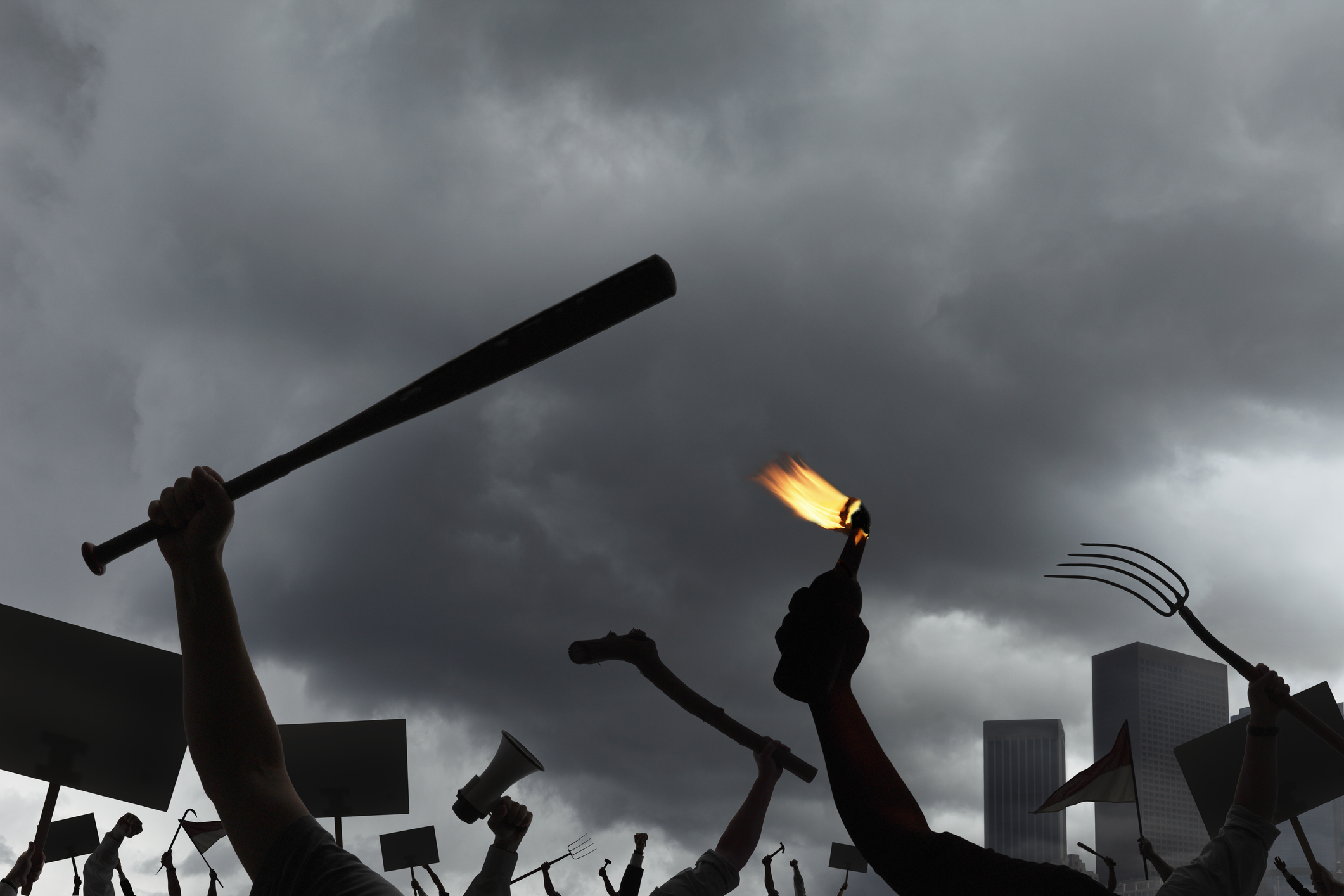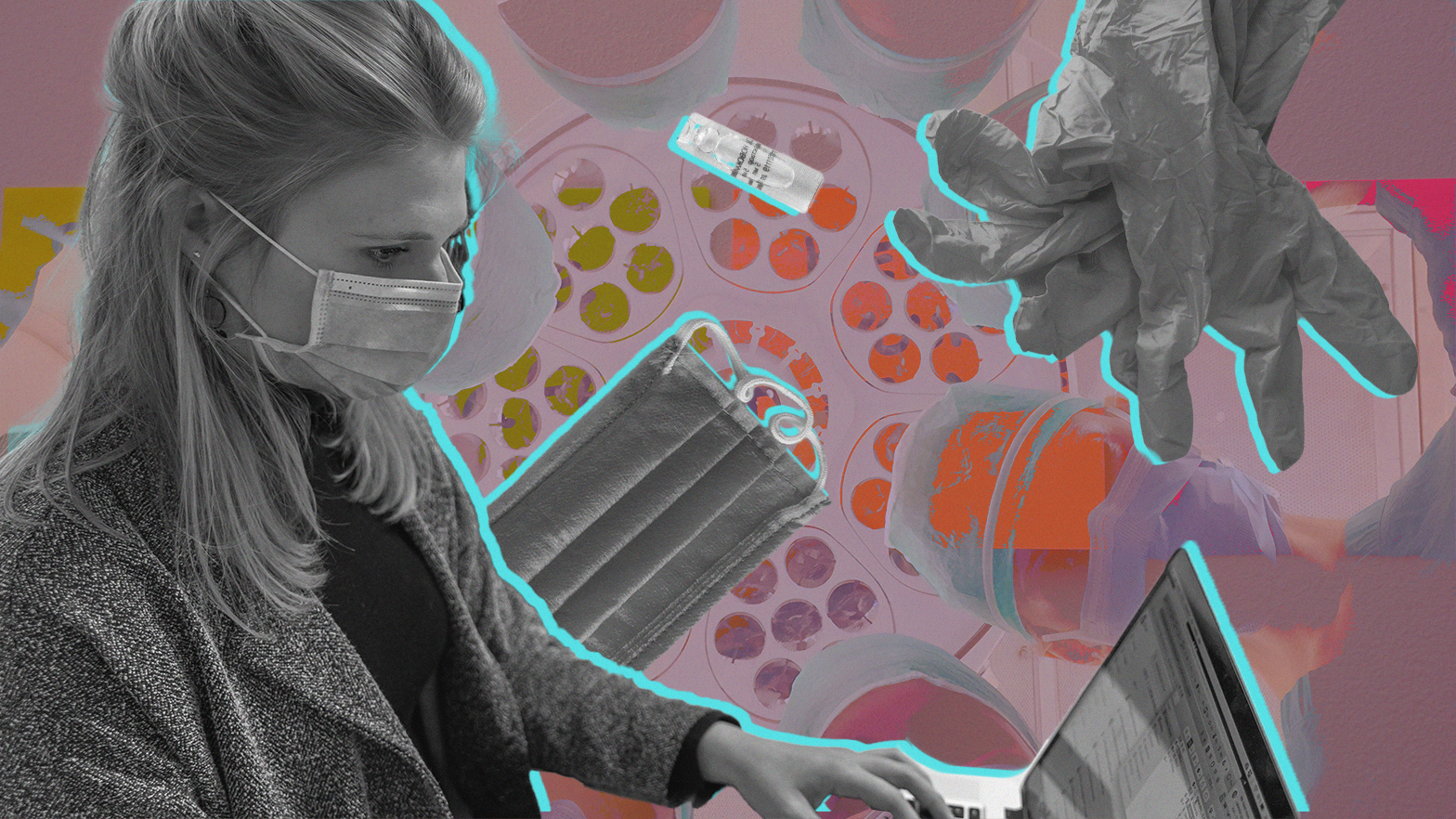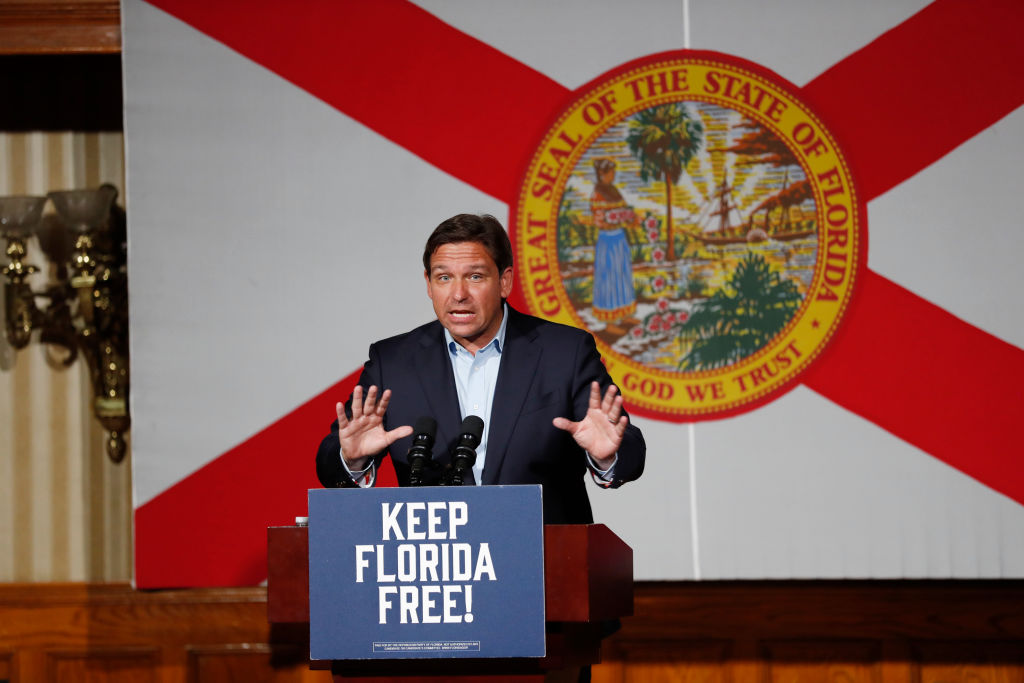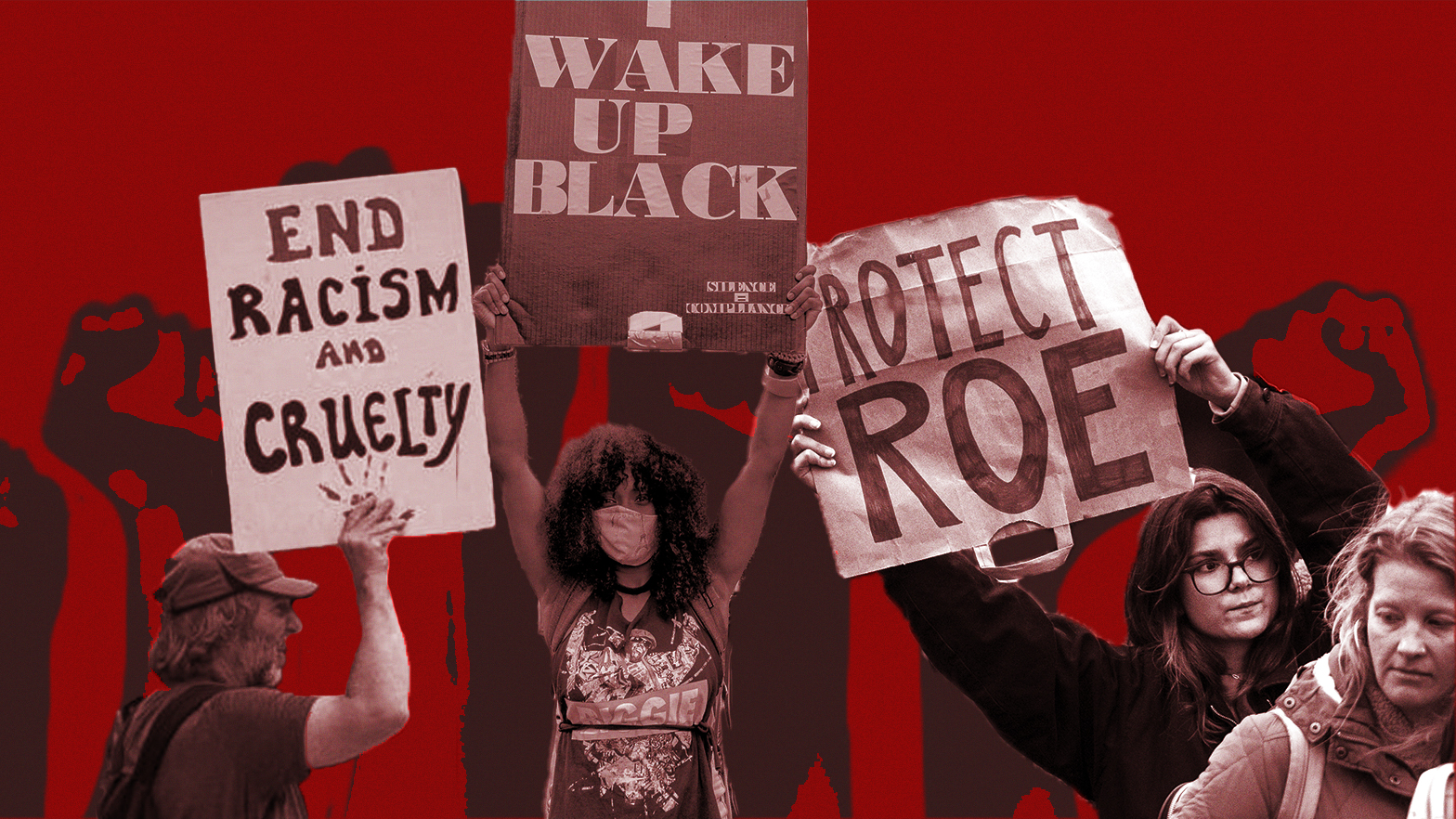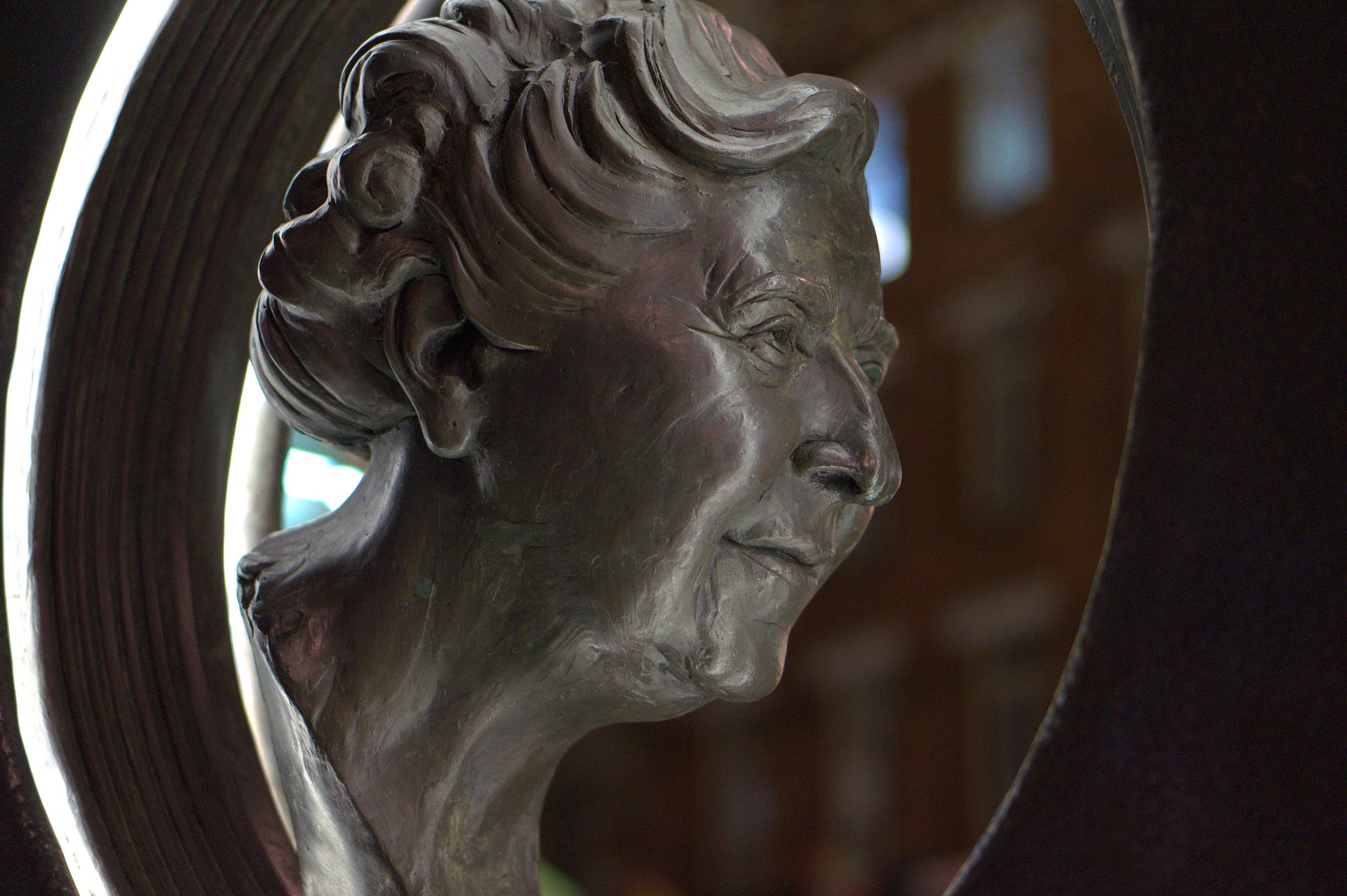In a ravaged post-Christian landscape, faith and family emerge as fallout shelters.
Militant Therapy is Eating America Alive

The animating principle of Wokeness is self-destructive navel-gazing.
Over the last month, we have witnessed the woke intersectionality once confined to college campuses spill out violently into the streets—with approval from leaders of both our political parties. Democrat leaders Nancy Pelosi and Chuck Schumer arranged to have themselves and other Democrats photographed at the Capitol, eagerly kneeling in abasement, their shoulders draped with kente cloth. Former presidential hopeful Mitt Romney signaled his solidarity by posting a photo of himself at a Black Lives Matter protest. Presumptive presidential aspirant Nikki Haley tweeted that George Floyd’s death “needs to be personal and painful for everyone.”
Still more alarming, the woke creed has also been cynically installed throughout corporate America. One can barely use an app or stream a movie these days without encountering the spirit of compulsory emotional labor around racism consciousness and political correctness. Simply questioning the propriety of BLM-themed “work” leads to professional termination. Tech giant Cisco, for instance—shortly after pledging $5 million to antiracist causes—fired some employees for expressing views it deemed “demeaning to Black people,” which appear to have been little more than the increasingly taboo affirmation that “all lives matter.”
Racism, we are told, is “systemic” in America. After being thrown out of polite society, those of us who reject the woke creed are being threatened with exclusion from society altogether. Our ideological enforcers don’t care that their evidence for woke claims is mostly lies. How, then, can Americans be so fundamentally divided in their perception of racial injustice? What do the woke religionists think they are seeing that we are not? Setting aside the cynical grasping for power, we need to understand the sources of their delusion.
From Autonomy to Trauma
The most obvious fact about our riots is also the most important: privileged white kids are busy pretending they feel by proxy the most horrifying injustices perpetrated against black slaves centuries back. This collective sensation is a fantasy that conceals a deep self-obsession. More than black lives, the woke insist that their power to imagine whatever they wish about themselves into being matters above all. Any authority that would hinder the experience of this autonomous self-creation is an enemy.
But we all know that the pursuit of pure autonomy is as futile as self-obsession is perverse. We all know we’re part of a universe and a society with traditions that have educated us and, really, given us everything we have, good and bad. No child can grow up without facing the necessities of this world and the discipline we adults give him. The feral alternative can be seen in Truffaut’s The Wild Child (1970): A human being that scampers on all fours, cannot focus its attention, and cannot learn to speak. Without authority, man is a subhuman yahoo.
And in fact, the woke obsession with totalizing fantasy evinces deep feelings of self-loathing—feelings, the woke believe, that only radical self-recreation can overcome.
That helps explain why, despite the violence and resentment animating their revolutionary urges, their utopian sensibility thrusts so reliably toward the cosseted, pampered, “safe” space of childhood. The ideal of autonomy is an abstraction that walked out of the books of philosophers into the brains of artists, intellectuals, and other writers, until it became the everyday language of self-help books, TED talks, education schools, and even politicians.
The effectual truth of autonomy, however, is not some kind of spiritual discipline—it’s being a consumer in the Disney fantasy that liberalism, commerce, and technology are making of our world. Autonomy thus becomes the name for the processes of the globalized, cosmopolitan market—which tempts, cajoles, and gradually compels us to try on identities as easily as clothes (which are part of our identities) through the accumulation of debt. Wokeness has coopted the fantasy economy, its vengeful beneficiaries of easy credit (via student loans) demanding they receive blank checks for their unlimited pursuit of self-creation.
By the end of the ’90s, the servile and infantile character of the fantasy economy had attracted serious cultural criticism. In pop culture, that blowback reached its high-water mark with Fight Club, a film whose power as a symbol of the fruitlessness of commercialized fantasy is now a commonplace. But the rise of internet technology breathed new life into our delusions of autonomy, habituating us to seek micro-satisfactions around the clock on and through our screens.
With the press of a button or two we can order any product, play any movie or song, create any image. The world Steve Jobs made for us with the iPhone makes us feel powerfully free, almost like gods—a valuable sensation indeed when, in the world beyond our screens, we know we have been reduced to a stature beneath that of our proper human capabilities. No wonder people online seamlessly switch between acting as if they are without real freedom and speaking as if there are no laws, limits, or real-world constraints.
The costs of substituting screen life for real life have mounted quickly. When kids raised on screens are deprived of play and the experience of risks in the real world, they become cowards, making them more prone to anxiety and depression. When this play is replaced by a rigid structure of extracurriculars to facilitate college admissions and eventually access into the neoliberal economy, the self learns to perform successfully in a limited sphere but is nonetheless denied a sense of its own agency in the real world.
Depression and anxiety are thus compounded when the self comes up against limits to its performance. It turns out not everything is possible. A generation reared as consumers by helicopter parents and screens react as traumatized children when they think they perceive limits to the self-creation or realization of others.
Therapeutic Terror
But this does not explain why race and “gender” should factor so prominently into their judgments. The most outrageously insane examples are also the most educational when it comes to the identity of the oversensitive and the bullying, the snowflake and the SJW.
Our cancel culture now even demands technologists cease and desist using the words “master” and “slave” in hardware naming conventions. Machines, not just people, must now be made politically correct. This mad, traumatized pose reflects both a radical distaste for the self-mastery necessary to human excellence and a radical resentment toward excellence itself. Those who excel at self-mastery, who therefore do not loathe themselves, become the enemy.
Common Americans know that chess masters and golf masters, master sergeants and master chefs, and everyone else called a master, is someone to admire and imitate. Our elite has bred a decadent collegiate class so triggered and traumatized by such standards of self-mastery that they demand revolutionary deliverance into a safely servile state.
The social theorist Philip Rieff dubbed this ostensibly autonomous, actually servile individual therapeutic man, and the culture that has bred him an anti-culture. Culture, writes Rieff, is a sacred order in which creedal commands and prohibitions have objective validity, the transgression of which lowers us in the “vertical” of creedal authority. A denizen of the pre-modern world of faith knew, in a way alien to therapeutic man, that violating any of the Ten Commandments was truly wrong, a stain on one’s character.
Our world, as legislated by our officials and other elites, has repealed this hitherto universal feature of human culture. It has renounced renunciation, Rieff explains, and tried to replace it with consumerism, entertainment, and the release from inherited prohibitions. It has become a cult of the self that rejects the authoritative character of the Biblical “interdictions.” Guilt and shame for lowering autonomous acts like abortion, divorce, or adultery are to be banished as irrational, the acts themselves proudly destigmatized. Only to forbid is forbidden, as the French students declared in May 1968. Only shame is something to be ashamed of.
Therapies of disenchantment, to use R. R. Reno’s phrasing, criticize, historicize, and reduce traditional loyalties, in the name of making us moderns or postmoderns safe from the trauma of the 20th century and oppressive centuries previous. Patriotism becomes a sign xenophobia, if not fascism. Anything men accomplish is owing to the historical accident of patriarchy, as manliness itself becomes a “toxic” remnant of some pre-civilized bestiality.
Nor are women, though necessarily oppressed by the patriarchy, safe from being debunked if they are square enough not to check their “cisgender privilege,” thinking it’s normal not to believe they are men. Our new woke fascists believe that if you’re not woke to these crimes, then you’re the fascist; justice and purity, in their imagination, can only be found at the “intersection” of every assault on received creedal authority.
The ascent of multiculturalism’s intersectional successor heralds the triumph of the therapeutic. What we are seeing in the streets—the mob at war against statues and the people beyond them—is a weaponized therapy of slavish violence against man’s highest authority. BLM’s credo reveals its therapeutic vision:
Every day, we recommit to healing ourselves and each other…co-creating…a culture where each person feels seen, heard, and supported…. We are self-reflexive and do the work required to dismantle cisgender privilege and uplift Black trans folk, especially Black trans women…. We build a space that affirms Black women and is free from sexism, misogyny, and environments in which men are centered.
We disrupt the Western-prescribed nuclear family structure requirement by supporting each other as extended families and ‘villages’ that collectively care for one another.
This is the language of egalitarianism and therapy. Everything that carries authority in our society—and all authority means giving and obeying orders—is seen as oppressive privilege that painfully inhibits self-realization and recognition and thus must be “dismantled” or “disrupted.”
Rioters and vandals habituated to this pattern of thinking and feeling don’t care whether they are damaging images of men who worked to advance racial justice. Heroes, as much as villains, merely by being a part of an imperfect past that demanded obedience and renunciation, are oppressors. They were part of the society that causes these shallow children such pain. And they were themselves disciplined—they had a strength of character that the therapeutic children can never imitate.
Do the social justice warriors admire anyone? To the extent that they are therapeutics, they cannot. Admiration is for the excellent in authority; what the woke demand are martyrs to be avenged and scapegoats to take vengeance upon. One hears little about MLK. And even if they claim Marx as an inspiration, one would be surprised to see them following in the discipline of the liberal education Marx had. What if by chance wokies ever read Marx’s racist statements?
The New Police
The therapeutic roots of wokeness also help us understand the intensity of the reaction against the police and the plans to replace it with something ostensibly more benign but in reality more smothering and punitive. The police, with their uniforms and firearms, have an immediate authority that is distasteful to the therapeutic democrat.
Police officers, in their role as officers of the law, command respect. Our faith in our laws and admiration of good policemen are precisely the standard by which we judge bad cops. But this reputation can also cause envy and resentment. So in their place, we are offered, in the case of Minneapolis, the less triggering and more egalitarian “Department of Community Safety and Violence Prevention.” The word to which the authority was symbolically attached is dropped, while its chief function is retained and the community in its homogeneity is emphasized.
But if the officers of this department are not in authority, why should anyone obey their orders? We’re all the community—why then would we call them specifically for help? Perhaps because the locus of policing has moved into the community itself, which must “do the work” of ritually hunting, unmasking, and denouncing oppressors around the clock, online and off.
As Christopher Caldwell has recently argued, this political triumph of the therapeutic originated in the 1964 Civil Rights Act—which enshrined into law recognition of America’s original sin and the duty to atone for it by any means necessary—and its subsequent use of the unique black experience as a template or algorithm to convert ever more “marginalized” groups into living martyrs requiring retributive justice against scapegoats in authority.
This transformed the American understanding of freedom of association as it created a rival constitution through jurisprudence and administrative law. Though the constitution of 1789 remains in place de jure, the principles of therapeutic liberation worked up through the Civil Rights Act are now de facto the law of the land. Victim status has been legally officialized.
There is as yet no telling how far those who subscribe to the militant therapeutic ethos will go to unleash the vengeful imaginations of officialized “victim” groups everywhere. While Caldwell acknowledges that our de jure constitution is with us still, he does not articulate how being a partisan of it in the first half of the 21st century can protect us from woke tyranny: he’s rightly ambivalent about conservatism’s successes over the past three generations.
Indeed, he offers a much-needed revision of Reaganism, which expanded the therapeutic state and globalized therapeutic culture sometimes in spite of itself. All of us who understand the danger the woke creed poses to us must now seek to protect our children and friends from the next step in the woke insurrection, already being mooted online by the woke militant: making therapy itself both official and mandatory.
Recovering the Real
By carving out defensible space for that strategy of protection, philosopher-mechanic Matthew Crawford helps point the way.
In his first two books, Shop Class as Soulcraft (2020) and The World Beyond Your Head (2016), Crawford shows how our fully human engagement with the real world leads us to reject the fantasy ideal of autonomy. He rehabilitates authority by way of embodied agency. Tactile enterprises devoted to excellence return us to healthier community life. The hands-on problem solving of the tradesman and craftsman, the necessary work our collegiate elites fear and loathe, is a re-education into reality.
Through a philosophical analysis of skilled work, Crawford helps us conceive of authority through our embodied attention to physical reality. Learning a trade or craft inevitably requires a prolonged practice of submission to the materials and tools involved, and the end in light of which one works. The materials and tools thus train one in an attentive respect.
The mere act of appropriately hammering a nail into a piece of wood requires that one feel the weight of the hammer and transfer it to the head of the nail with just enough force to penetrate the surface. Too little and one will not make a dent; too much, and the wood can split. We make judgments of a sort with our bodies, based on the indisputable limits of the physical reality before us and its relation to our practical goals.
The physical and cognitive demands of course change and become more complex depending on the kind of work one is doing. Repairing a motor is different from building or wiring a house. But in all cases, one must submit oneself to the authority of the physical, ultimately natural, artifacts in question.
There is nobility in the sober self-command and self-reliance this teaches. The more a man knows about how the machines in his life work, the better able he is to ensure they work for him, fixing things for himself when they inevitably fail. The more willing he is to build things for himself, the less dependent he is on an economy of mass-produced junk. The disciplined lives of master craftsmen sidestep and oppose the trauma of betrayal that fuels the anxious resentment of the autonomous yet servile.
The work of a trade necessarily occurs in a community of skilled practice, with masters and apprentices working toward a shared and tangible common good. In such communities individuals experience their agency through the attainment of competence in dealing with the real world, the human needs of their customers, and the appropriate technologies. This competence can even culminate in the recognition of excellence.
Only a fellow in such a community is capable of bestowing meaningful praise. The trades teach parents and children to become at once cooperative about the common good and nobly serious about themselves and their work. By fostering attentive concentration, they prevent ostensible add-ons like Facebook and Apple from taking away all else around and inside us.
What’s more, the objective, visible, and tangible standards the trades provide obviate the apparent need for the speech codes and diversity training in the corporate knowledge economy, since, as Crawford writes,
when there is no concrete task that rules the job—an autonomous good that is visible to all—then there is no secure basis for social relations. Maintaining consensus and preempting conflict become the focus of management, and as a result everyone feels they have to walk on eggshells. Where no appeal to the carpenter’s level is possible, sensitivity training becomes necessary.
The self-esteem sought by the postmodern therapeutic is unconnected from any concern for objective excellence or for something tangible they’ve created. It is socially constructed, subject to arbitrary manipulation. This passionate negation of any commanding limits on such manipulation, and the fantasizing impulses behind it, is all there is.
In his most recent book, Why We Drive, Crawford contrasts an adult soap box derby in Portland with a motorcycle race in Virginia. The former ends up being little more than a stage for progressive men and women to dramatize transgressive role reversals and unwittingly reenact the courtly deference to women in the decadent aristocracy of France. Victory is not their concern. In the motorcycle race, redneck women compete seriously for victory on a level of equality with men. Unaware of their duty to struggle against oppression, men and women become stronger together through the shared, playful pursuit of excellence.
In the desert of Nevada, too, Crawford finds platoons of men and women associated around an annual race that unites the community in a manner impossible under the strictly enforced traffic laws in an Eastern city. Crawford points out how American traffic generally is managed by a system of rule-following that is inseparable from its individualism.
In one way, rules, in their apparent impartial neutrality, are the heart of liberal government. But strict rule-following depends on and fosters therapeutic individualism. It relieves atomized individuals of the duty to take responsibility for their own competent motorized activity and spontaneously develop the trust and norms through which traffic in a place like Italy can come to manage itself.
The future being pushed on us today uses transportation to wipe away these habits and competencies. Automated vehicles and even overreliance on traffic lights give us constant occasion to focus more on the screens in our hands than the world outside our heads. This habituated incompetence at self-transportation is messaged to us as the inevitable and desirable manifestation of Progress itself, which promises autonomy for one and all.
Self-government and the responsible pursuit of agency and excellence are still alive, if hard to find, in America. There are working-class men and women who know how to deal with the risk and conflict that inevitably arise when we encounter the real world—and who have learned this through the spirit of play. Though they are not broadly esteemed in our techno-therapeutic oligarchy, the approval of this authority is unnecessary for one who takes his or her cue from the objective standards of excellence that emerge in a trade or through play.
If we wish to restore cultural sanity, or at least spare some of our young the infantilization and dehumanization of therapeutic culture, we will push back against the moral ideal of autonomy as encouraged in our technological anti-culture and heed the examples of the tradesman and the unregulated voluntary association.
From a young age, children need to experience how the world offers real resistance to their immediate inclinations. They should be allowed to play unsupervised, and get dirty. Concerned, thoughtful parents should steer their kids away from the contemporary university—unless they feel compelled by a deep inner need to read great books for four years—as it is inimical to meaningful character formation, and little more than a ticket to an economy of therapeutic bureaucracies. A cubicle, under cold and flickering fluorescent lights, is an unfit abode for a free human being.
To help our young people along, let’s establish secondary schools to train them in a trade in tandem with their required studies. They would be prepared to practice professionally by the time they graduate high school, and never have to confront the debt, indoctrination through therapies of disenchantment, and wasted time that comes with college. They would be trained in habitual self-command, instead of intentional self-display. Self-sufficient, and masters of themselves, they would be less vulnerable to the resentful cult of self-creation and expression at the heart of therapeutic society.
Perhaps most importantly of all, our tradesmen show how to cherish human excellence, and the order on which it depends. Though it is in principle available to every human being—regardless of any particular group identity—the love of excellence cannot grow in the acid of therapeutic soil, where all higher feelings are debunked and all lower impulses celebrated. It requires the willing and habitual submission to real masters, neither the mob swarming our streets nor the elite burrowing into our heads.
The American Mind presents a range of perspectives. Views are writers’ own and do not necessarily represent those of The Claremont Institute.
The American Mind is a publication of the Claremont Institute, a non-profit 501(c)(3) organization, dedicated to restoring the principles of the American Founding to their rightful, preeminent authority in our national life. Interested in supporting our work? Gifts to the Claremont Institute are tax-deductible.
Doctors must reject Big Pharma's soulless treatment model.
The governor of Florida is taking a firm hand to combat the spread of DEI in the state university system.
Wokeness’s war against sex and gender descends to clownish levels.
The counter-universities defying wokeness in higher education.
Our woke commissars continue their march.

